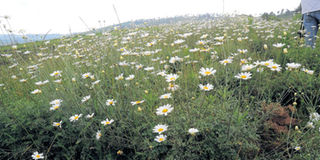Row simmers over plan to export pyrethrum by county

The West Pokot County boss wants local farmers to export pyrethrum, claiming that the board has unfriendly market terms. Photo/FILE
What you need to know:
- In an interview with Smart Company, Mr Kachapin said many farmers abandoned the crop in 2007 due to lack of markets and delayed payments by the board.
A conflict is brewing between West Pokot County and the Pyrethrum Board of Kenya over the former’s plan to by bypass the latter and seek external markets for the cash crop.
County governor Simon Kachapin said he has embarked on efforts to find an alternative market for the crop, adding that it would be one of the major revenue earners under the area’s economic plan.
But in a quick rejoinder, PBK managing director Isaac Mulagoli said the Crop Act 2013 prohibits direct export of selected crops that include pyrethrum.
He said delayed payments were due to the low volumes of the produce from farmers. “We can only start processing the crop once we have received 100 metric tonnes, which is the required capacity for the machines,” he said.
The MD said the board has embarked on paying farmers in advance and is currently supplying planting materials to farmers in what he said was an indicator that growers have started embracing the crop.
Lack of market
Apart from livestock, Pokot county has no other major source of income apart from central government allocations.
In an interview with Smart Company, Mr Kachapin said many farmers abandoned the crop in 2007 due to lack of markets and delayed payments by the board. He added that the best way of reviving the crop was through direct marketing outside the country.
The governor said the economic benefits of the crop cannot be downplayed by his administration given that the region was one of the highest quality producers.
“Research in the past has revealed that West Pokot produces pyrethrum with high content of pyrethrin in the country and there is no doubt that this would be a major source of income if well tapped,” said Mr Kachapin.
He claimed that PBK was not keen on improving market terms for the benefit of the farmer. “We have realised that relying on the board is a waste of time given that its management does not have the interests of the farmers at heart,” said Mr Kachapin.
But PBK insisted that it has looked after the interests of pyrethrum farmers in the country. “Nobody will dispute that PBK is the only saviour of the pyrethrum farmers in Kenya,” said Mr Mulagoli.
The county boss said he has held talks with a number of private investors and was working on a formula of ensuring that the region directly exports the crop without going through PBK which he claimed has unfriendly marketing terms.
Farmers mostly from Lelan area said they had lost faith in PBK’s “delaying” tactics and were contemplating shunning the crop in favour of potatoes if the county government fails to fulfil their hopes.
Mr Philip Losiwa, a farmer at Kapsait area, said the crop used to be the regions’ economic mainstay between 2003 and 2007 but matters changed after the pyrethrum board decided to shift its management gears, turning the mode of payment into a nightmare.
Mr Patrick Yano, a grower in the neighbouring Elgeyo Marakwet County said: “I used to grow this crop in the past because it was the leading income earner across this region but since the pyrethrum board began playing tricks on payment, I was forced to switch to other economic activities.”
He said the future of the crop now lies in the direction that will be taken by the county governments in the two regions in terms of market sourcing.




